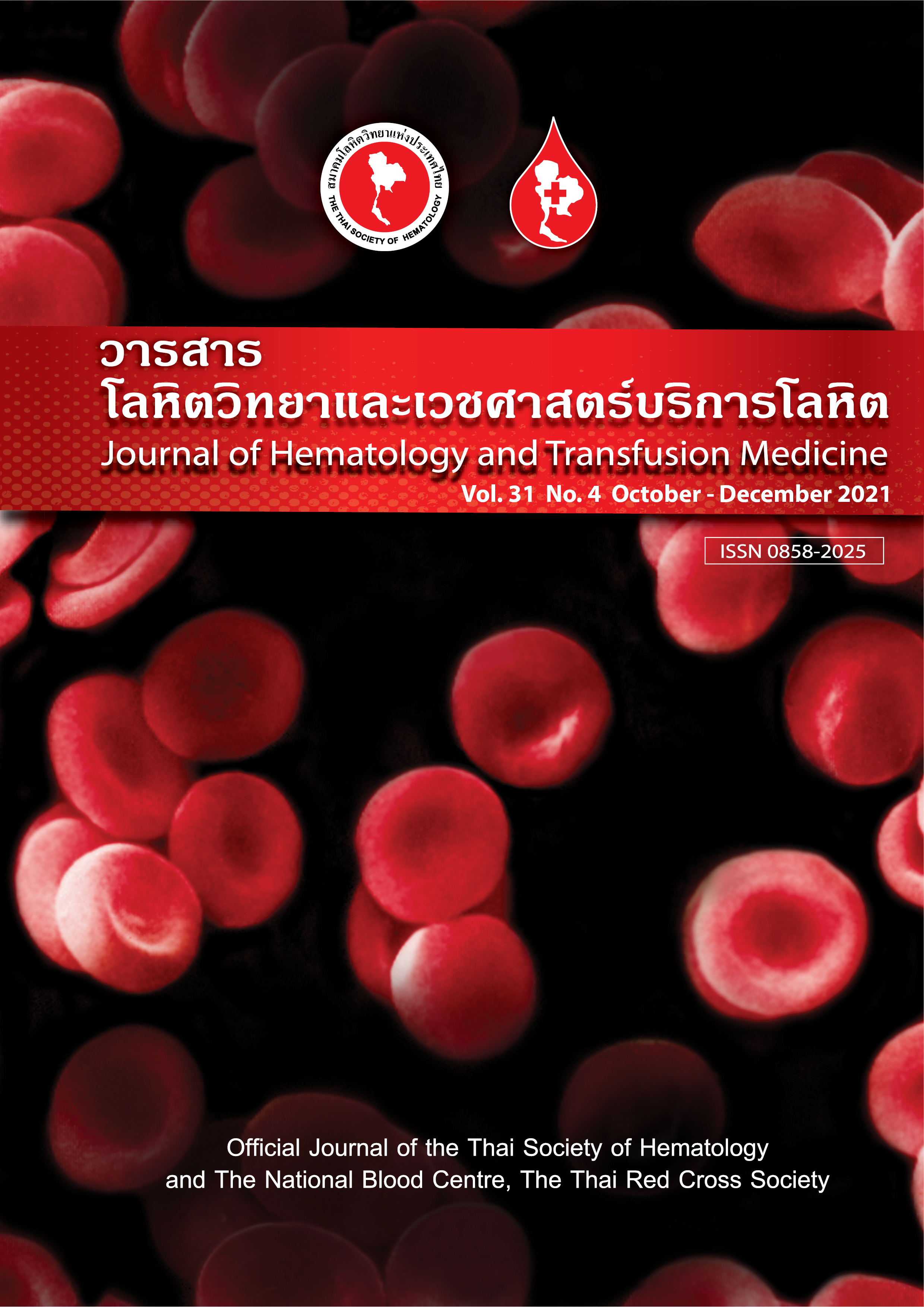Pyruvate Kinase Deficiency presented with Severe Anemia and Jaundice
Keywords:
pyruvate kinase deficiency, non-spherocytic hemolytic anemia, PKLR mutationAbstract
Pyruvate kinase enzyme is an enzyme in glycolytic pathway of red blood cells which plays the important role in producing energy or ATP for red blood cells. Pyruvate kinase deficiency is a rare congenital red cell disorder caused by mutation in PKLR gene on chromosome 1q12. Homozygous or compound heterozygous mutation in PKLR gene can cause non-spherocytic hemolytic anemia due to lack of red cell ATP, leading to inability to maintain red cell membrane integrity and electrochemical gradients. We report clinical presentations, laboratory investigations, genetic testing for diagnosis and management of a 1-year-old Thai girl with a history of severe non-spherocytic hemolytic anemia and neonatal hyperbilirubinemia, required an exchange transfusion, at 24 hours of life. She received a regular red cell transfusion since day-of-life 2 and was subsequently diagnosed with Pyruvate kinase deficiency.
Downloads
References
Grace RF, Glader B. Red blood cell enzyme disorders. Pediatr Clin North Am. 2018;65:579-95.
Sivashangar A, Gooneratne L, Clark B, Rees D, Jayasinghe S, Laas C. A Sri Lankan girl with a new genetic variant in the PKLR gene causing pyruvate kinase deficiency: a case report. J Med Case Rep. 2021;15:374.
Grace RF, Zanella A, Neufeld EJ, Morton DH, Eber S, Yaish H, et al. Erythrocyte pyruvate kinase deficiency: 2015 status report. Am J Hematol. 2015;90:825-30.
Grace RF, Barcellini W. Management of pyruvate kinase deficiency in children and adults. Blood. 2020;136:1241-9.
Beutler E, Gelbart T. Estimating the prevalence of pyruvate kinase deficiency from the gene frequency in the general white population. Blood. 2000;95:3585-8.
Bianchi P, Fermo E, Glader B, Kanno H, Agarwal A, Barcellini W, et al. Addressing the diagnostic gaps in pyruvate kinase deficiency: consensus recommendations on the diagnosis of pyruvate kinase deficiency. Am J Hematol. 2019;94:149-61.
Oski FA, Nathan DG, Sidel VW, Diamond LK. Extreme hemolysis and red-cell distortion in erythrocyte pyruvate kinase deficiency. I. morphology, erythrokinetic and family enzyme studies. N Engl J Med. 1964;270:1023-30.
Mentzer WC, Jr., Baehner RL, Schmidt-Schönbein H, Robinson SH, Nathan DG. Selective reticulocyte destruction in erythrocyte pyruvate kinase deficiency. J Clin Invest. 1971;50:688-99.
Nathan DG, Oski FA, Miller DR, Gardner FH. Life-span and organ sequestration of the red cells in pyruvate kinase deficiency. N Engl J Med. 1968;278:73-81.
Delivoria-Papadopoulos M, Oski FA, Gottlieb AJ. Oxygen-hemoglobulin dissociation curves: effect of inherited enzyme defects of the red cell. Science. 1969;165:601-2.
Bunn HF, Briehl RW. The interaction of 2,3-diphosphoglycerate with various human hemoglobins. J Clin Invest. 1970;49:1088-95.
Oski FA, Marshall BE, Cohen PJ, Sugerman HJ, Miller LD. The role of the left-shifted or right-shifted oxygen-hemoglobin equilibrium curve. Ann Intern Med. 1971;74:44-6.
Tanaka KR, Paglia DE. Pyruvate kinase deficiency. Semin Hematol. 1971;8:367-96.
He Y, Luo J, Lei Y, Jia S, Liao N. A novel PKLR gene mutation identified using advanced molecular techniques. Pediatr Transplant. 2018;22. doi: 10.1111/petr.13143
Qu Y, He H, Du J, Hou J, Fu W. Analysis of a pyruvate kinase deficiency consanguineous pedigree caused by Ile314Thr homozygous mutation. Zhonghua Xue Ye Xue Za Zhi. 2014;35:601-4.
Bianchi P, Fermo E. Molecular heterogeneity of pyruvate kinase deficiency. Haematologica. 2020;105:2218-28.
Bianchi P, Fermo E, Lezon-Geyda K, van Beers EJ, Morton HD, Barcellini W, et al. Genotype-phenotype correlation and molecular heterogeneity in pyruvate kinase deficiency. Am J Hematol. 2020;95:472-82.
Fermo E, Bianchi P, Chiarelli LR, Cotton F, Vercellati C, Writzl K, et al. Red cell pyruvate kinase deficiency: 17 new mutations of the PK-LR gene. Br J Haematol. 2005;129:839-46.
Costa C, Albuisson J, Le TH, Max-Audit I, Dinh KT, Tosi M, et al. Severe hemolytic anemia in a Vietnamese family, associated with novel mutations in the gene encoding for pyruvate kinase. Haematologica. 2005;90:25-30.
Kanno H, Fujii H, Miwa S. Structural analysis of human pyruvate kinase L-gene and identification of the promoter activity in erythroid cells. Biochem Biophys Res Commun. 1992;188:516-23.
Noguchi T, Yamada K, Inoue H, Matsuda T, Tanaka T. The L- and R-type isozymes of rat pyruvate kinase are produced from a single gene by use of different promoters. J Biol Chem. 1987;262:14366-71.
Raphaël MF, Van Wijk R, Schweizer JJ, Schouten-van Meeteren NA, Kindermann A, van Solinge WW, et al. Pyruvate kinase deficiency associated with severe liver dysfunction in the newborn. Am J Hematol. 2007;82:1025-8.
Downloads
Published
Issue
Section
License
Copyright (c) 2021 Journal of Hematology and Transfusion Medicine

This work is licensed under a Creative Commons Attribution-NonCommercial-NoDerivatives 4.0 International License.



